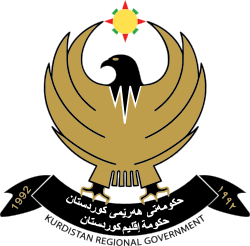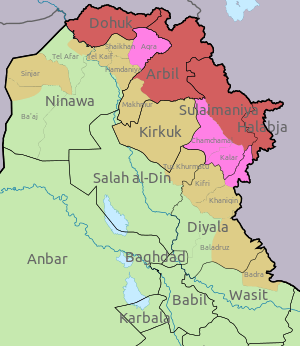Kirkuk status referendum
_of_Iraq_2008.svg.png) |
| This article is part of a series on the politics and government of Iraq |
| Constitution |
|
Government |
|
Legislature |
|
Judiciary |
|
|
Politics portal |
 |
| This article is part of a series on the politics and government of Iraqi Kurdistan |
|
Referendums |
|
|
Parliament
|
|
Recent elections
|
|
|
|
Politics portal |
The Kirkuk status referendum is the Kirkuk part of a plebiscite that will decide whether the Kurdish regions within Iraqi governorates of Diyala, Kirkuk, Salah ad Din and Ninawa will become part of the Iraqi Kurdistan region. The referendum was initially planned for 15 November 2007,[1] but was delayed first to 31 December,[2] and then by a further six months.[3][4] The Kurdish Alliance emphasized that the delay was for technical and not for political reasons.[5] As the election was not called by early December 2008, it was postponed again as part of the deal to facilitate the regional elections on 31 January 2009. No fresh date has yet been set.
Article 140 of the Constitution of Iraq states that before the referendum is carried out, measures should be taken to reverse the Arabization policy employed by the Saddam Hussein administration during the Al-Anfal Campaign. Thousands of Kurds returned to Kirkuk following the 2003 invasion of Iraq. The referendum will decide whether enough have returned for the area to be considered Kurdish.[6]
The Iraqi Constitution

Following the invasion of Iraq in 2003 by the United States-led coalition, the country was under the direct rule of the United States-appointed Coalition Provisional Authority, with advice from selected Iraqi leaders who sat on the Iraqi Governing Council. The IGC approved an interim constitution, the Law of Administration for the State of Iraq for the Transitional Period (Transitional Administrative Law, TAL), which established the framework for the drafting and approval of a permanent constitution.
The TAL included specific clauses providing for the return of and compensation for forced migrants and for the "resolution of disputed territories including Kirkuk" through arbitration:
- A. The Iraqi Transitional Government, and especially the Iraqi Property Claims Commission and other relevant bodies, shall act expeditiously to take measures to remedy the injustice caused by the previous regime’s practices in altering the demographic character of certain regions, including Kirkuk, by deporting and expelling individuals from their places of residence, forcing migration in and out of the region, settling individuals alien to the region, depriving the inhabitants of work, and correcting nationality. To remedy this injustice, the Iraqi Transitional Government shall take the following steps:
- 1. With regard to residents who were deported, expelled, or who emigrated; it shall, in accordance with the statute of the Iraqi Property Claims Commission and other measures within the law, within a reasonable period of time, restore the residents to their homes and property, or, where this is unfeasible, shall provide just compensation.
- 2. With regard to the individuals newly introduced to specific regions and territories, it shall act in accordance with Article 10 of the Iraqi Property Claims Commission statute to ensure that such individuals may be resettled, may receive compensation from the state, may receive new land from the state near their residence in the governorate from which they came, or may receive compensation for the cost of moving to such areas.
- 3. With regard to persons deprived of employment or other means of support in order to force migration out of their regions and territories, it shall promote new employment opportunities in the regions and territories.
- 4. With regard to nationality correction, it shall repeal all relevant decrees and shall permit affected persons the right to determine their own national identity and ethnic affiliation free from coercion and duress.
- B. The previous regime also manipulated and changed administrative boundaries for political ends. The Presidency Council of the Iraqi Transitional Government shall make recommendations to the National Assembly on remedying these unjust changes in the permanent constitution. In the event the Presidency Council is unable to agree unanimously on a set of recommendations, it shall unanimously appoint a neutral arbitrator to examine the issue and make recommendations. In the event the Presidency Council is unable to agree on an arbitrator, it shall request the Secretary General of the United Nations to appoint a distinguished international person to be the arbitrator.
- C. The permanent resolution of disputed territories, including Kirkuk, shall be deferred until after these measures are completed, a fair and transparent census has been conducted and the permanent constitution has been ratified. This resolution shall be consistent with the principle of justice, taking into account the will of the people of those territories.
— Article 58, Law of Administration for the State of Iraq for the Transitional Period
In 2005, a permanent Constitution was approved which referred back to the TAL and set a deadline of the end of 2007 for completion:
- First: The executive authority shall undertake the necessary steps to complete the implementation of the requirements of all subparagraphs of Article 58 of the Transitional Administrative Law.
- Second: The responsibility placed upon the executive branch of the Iraqi Transitional Government stipulated in Article 58 of the Transitional Administrative Law shall extend and continue to the executive authority elected in accordance with this Constitution, provided that it accomplishes completely (normalization and census and concludes with a referendum in Kirkuk and other disputed territories to determine the will of their citizens), by a date not to exceed the 31st of December 2007.
— Article 140, Constitution of Iraq
In late 2007, the U.N. Special Representative for Iraq negotiated an extension of the deadline for six months. However, the federal parliament decided to refer the matter to the Constitutional Court to rule whether the article was now expired or how it should be implemented.[7]
De-Arabization
"We shall accept a solution for Kirkuk worked out by the parties inside the city and oppose any solution imported from outside parties that are enemies to the Kurdish people's experiment."
The government of Nouri al-Maliki has appointed a "Commission on the Normalisation of the Status of Kirkuk", to implement the de-arabization program. The Justice Minister, Hashim Abderrahman al-Shibli, a secular Sunni Arab from the secular Iraqi National List coalition was appointed the head. A program of normalisation was to be followed by a census by July 2007 and a referendum in November 2007.
In April 2007, Turkish intelligence sources claimed that Kurdistan President Barzani had "offered bribes to various Iraqi officials" involved in the Commission, including $500,000 to al-Shibli.[9] Turkey claimed that Iraqi Kurdistan was planning to annex Kirkuk "illegally", and that the rights of Iraqi Turkmen would be violated if Kirkuk joined Iraqi Kurdistan.
Shibli resigned as head of the Commission in March 2007, citing disagreements with his own coalition on Kirkuk.[10] Raed Fahmy Jahid, another Sunni Arab from the INL was appointed his replacement in August 2007.[11]
In February 2007, the Commission adopted a controversial plan, which gave Sunni Arabs $15,000 to relocate back to their towns of origin, plus a plot of land in their new home.[5]
In September 2007, it was reported that the normalization program had been bogged down in technical difficulties. The Kurdish parties were reported to have agreed a delay to the timetable for the census and referendum.[5]
Position of Iraqi parties
- Shi'ite Arab parties
- The Sadrist Movement called for the referendum to be postponed in June 2007.[12]
- Supreme Islamic Iraqi Council: In July 2007 they were reported to have supported a delay.[13]
- Kurdish parties
- Massoud Barzani, Kurdistan Democratic Party head has said that a delay of three to four months would be acceptable.[13] In September 2007, a news agency reported that the Kurdish parties had agreed a postponement to May 2008. However, Barzani said that failure to implement the law would "result in real civil war".[5]
- Sunni Arab parties
- The Iraqi National Dialogue Front called for a delay in June.[12]
- The Iraqi Accord Front proposed a delay in June, by way of an amendment to the Constitution of Iraq[13]
- Turkmen parties
- Sadettin Ergeç, the leader of the Iraqi Turkmen Front said in June that they aimed to save Kirkuk as the capital of Iraqi Turkmens or at least earn it a special status.[14]
International reactions
The Turkish government strongly opposed holding of the upcoming referendum in 2007, calling for it to be postponed. Iraqi Deputy Prime Minister Barham Salih said in a statement posted on the internet on 9 December 2006, "The issue of Kirkuk will be resolved in accordance with the Iraqi Constitution Article 140. Consequently, this constitutional question will be resolved by the Iraqis themselves. No one can interfere in that." On 10 December, in a speech made at the International Institute of Strategic Studies in Manama, Bahrain, Turkish Defense Minister Vecdi Gonul warned the Iraqi government against imposing an "unrealistic" future on Kirkuk. Iraqi Foreign Minister Hoshyar Zebari criticized Gonul, saying, "You speak of Kirkuk as if it is a Turkish city. These are matters for Iraq to decide."[6]
The Iraq Study Group of senior American politicians recommended that the referendum be delayed "to avert communal violence given the very dangerous situation in Kirkuk".
Iran called for a delay of two years for political reasons in early November 2007.[2]
Saudi Arabia reportedly offered the Iraqi Kurdish leaders $2 billion in exchange for delaying the process for ten years.[15]
Mediation
In June 2008 the UNAMI head, Staffan de Mistura recommended that the Akra District of Ninawa Governorate and the Makhmur District of Kirkuk Governorate be incorporated into Kurdistan but that the al-Hamdaniya area of Ninawa Governorate and the Mandali area of Diyala Governorate be excluded. These recommendations were rejected by the Council of Representatives of Iraq.[16]
See also
- Disputed territories of Iraq
- Arabization
- Anfal Campaigns
- Iraqi Kurdistan
- Demography of Iraq
References
- ↑ Iraqi Council of Ministers Presented to the Parliament by Prime Minister Nuri al-Maliki www.export.gov/Iraq
- ↑ 2.0 2.1 Iran pleases Ankara, irks Kurds with call for Kirkuk poll delay, The New Anatolian, 2007-11-08, accessed on 2008-03-01
- ↑ Members-Only Content | Stratfor
- ↑ Kirkuk, Other Iraq Issues to Be Delayed
- ↑ 5.0 5.1 5.2 5.3 Iraq: Kirkuk Referendum Likely To Be Delayed, Radio Free Europe, 2007-09-13, accessed on 2007-09-14
- ↑ 6.0 6.1 Iraq: Kurds warn against delaying Kirkuk Referendum RadioFreeEurope/RadioLiberty
- ↑ Kirkuk's Article 140: Expired or Not?, Nazar Janabi, Washington Institute for Near East Policy, 2008-01-31
- ↑ Kurds, Arabs Maneuver Ahead of U.N. Report on N. Iraq by Ernesto Londoño, Washington Post, April 17, 2009
- ↑ Turkish special rep. to Iraq brings documents showing "Barzani bribes" to the US, Hurriyet, 2007-04-11, accessed on 2007-09-14
- ↑ Iraq's justice minister resigns, BBC, 2007-03-31, accessed on 2007-09-14
- ↑ Profile of New Head of Iraqi Commission on Normalization of Kirkuk Status, BBC Monitoring via IndustryWatch, 2007-08-02 accessed on 2007-08-05
- ↑ 12.0 12.1 Muqtada: Postpone Kirkuk Referendum, Sawt al-Iraq translated by Informed Comment, 2007-06-10, accessed on 2007-06-10
- ↑ 13.0 13.1 13.2 Sectarian disputes delay constitution, Gulf News, 2007-07-09, accessed on 2007-07-09
- ↑ Turkmen Front delegation in New York, wants special status for Kirkuk, The New Anatolian, 2007-06-29, accessed on 2007-08-17
- ↑ Saudi Arabia offers Kurds 2 billion dollars to give up Kirkuk, Middle East Online, 2007-04-03, accessed on 2008-03-01
- ↑ Iraqi Kurds await U.N. regional recommendations, Kurdish Globe, 2008-08-12
External links
- Kirkuk: A constitutional issue
- Turkey seeks delay in Iraqi referendum on Kirkuk status
- British MP asks UK to support Kirkuk referendum
- Senator McCain supports delay for Kirkuk Referendum
- Kirkuk's Referendum revives fears of ethnic violence
- Iraq’s Future 101: The Failings of the Baker-Hamilton Report
| ||||||||||||||||||||||